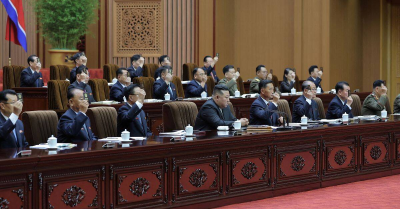Reuters-North Korea amends constitution on nuclear policy cites US provocations
September 28, 2023 4 min 719 words
这则报道再次突显了朝鲜核政策的坚定性和紧张局势。朝鲜修改宪法以明确其核力量政策,将其视为确保存在权和抵御所谓美国挑衅的手段。金正恩称这一政策为国家的基本法律,不容违背,还呼吁大规模生产核武器,扩展核打击手段,以回应美国在该地区的军事挑衅。此次宪法修改发生在金正恩署名一年前将先发制人核打击权利正式列入法律的背景下,进一步强调了朝鲜的核武器发展加速。金正恩还对美、韩、日三方合作表示反感,将其比作“亚洲版的北约”。这一举动在他最近的俄罗斯之行后出现,引发了美国和韩国的担忧,认为朝鲜可能在技术上寻求支持,同时俄罗斯可能寻求朝鲜的武器补给。分析人士认为,朝鲜宪法的修改预示着其核武器发展的加速,很可能随之而来的是与俄罗斯的扩大军事合作,这将加剧东北亚地区的新冷战和朝鲜半岛的军事紧张局势。这一报道也出现在韩国举行了十年来首次大规模军事阅兵之后,显示了地区紧张局势的升级。此外,朝鲜决定驱逐美国士兵特拉维斯·金,这也成为报道的一部分,突显了局势的不稳定性。总的来说,这一报道凸显了朝鲜核问题仍然是国际社会的一个严重挑战,需要持续的外交努力来解决。同时,也强调了地区稳定和军事平衡的重要性。
North Korea has adopted a constitutional amendment to enshrine its policy on nuclear force, state media reported on Thursday, as the country's leader pledged to accelerate production of nuclear weapons to deter what he called U.S. provocations.
The North's rubber-stamp parliament, the Supreme People's Assembly, unanimously adopted at a two-day meeting which ended on Wednesday the revision of the constitution to stipulate that North Korea "develops highly nuclear weapons to ensure" its "rights to existence" and to "deter war", news agency KCNA said.
"The DPRK's nuclear force-building policy has been made permanent as the basic law of the state, which no one is allowed to flout with anything," North Korean leader Kim Jong Un said, addressing the parliament. DPRK are the initials of the North's official name, the Democratic People's Republic of Korea.
He called for "exponentially boosting the production of nuclear weapons and diversifying the nuclear strike means and deploying them in different services," saying the U.S. has gone to extremes in its military provocations with drills and the deployment of strategic assets in the region.
The amendment comes a year after North Korea officially enshrined in law the right to use preemptive nuclear strikes to protect itself, a move Kim had said would make its nuclear status "irreversible".
Kim urged officials to further promote solidarity with the nations standing against the United States, denouncing trilateral cooperation between the U.S., South Korea and Japan as the "Asian-version NATO."
"This is just the worst actual threat, not threatening rhetoric or an imaginary entity," he said.
Kim returned home last week from a rare trip to Russia during which he and Russian President Vladimir Putin agreed to boost military and economic cooperation.
U.S. and South Korean officials have expressed concern that Pyongyang could be seeking technological help for its nuclear and missile programs while Moscow tries to acquire ammunition from the North to supplement its dwindling stocks for the war in Ukraine.
Analysts said the North's amendment of the constitution signals further acceleration of its push for nuclear weapons development, and will likely be followed by expanded military cooperation with Moscow given Kim's recent Russia visit.
"The new Cold War in the Northeast Asia region and military tensions on the Korean peninsula will intensify," said Yang Moo-jin, a professor at the University of North Korean Studies in Seoul.
On Tuesday, South Korean President Yoon Suk Yeol warned Pyongyang against using nuclear weapon, as Seoul put on the first large-scale military parade in a decade, with weapons ranging from ballistic missiles to tanks rolling through Seoul in a show of force.
The announcement by parliament also comes after North Korean state media said on Wednesday Pyongyang had decided to expel Private Travis King, the U.S. soldier who ran into North Korea in July. The U.S. said he is now in American custody and heading home after being expelled to China.
In his speech, Kim said ensuring a major revamp of the country's economy was "the most pressing task for the government," and urged the agricultural sector to work harder to promote the people's well-being.
The North has suffered serious food shortages in recent decades, including famine in the 1990s, often as a result of natural disasters, and international experts have warned that border closures during the COVID-19 pandemic worsened food security matters.

